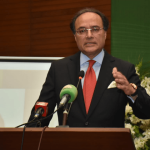Armloads of crimson flowers were carried by the mourners. A military gun salute was given. A large crowd gathered to witness the coffin being lowered into the earth. This was not a public figure or celebrity's funeral. This served as the farewell for Russian nationalist Telegram blogger Vladlen Tatarsky, who was murdered in an unexplained bombing at a St. Petersburg café in April.
Tatarsky's burial served as a symbol of the nationalist blogs in Russia that have grown in power as a result of the conflict in Ukraine. Known as military correspondents, or voenkory, they have filled the information void left by the government regarding real-time events on the front lines. Many have amassed enormous fan bases and are in charge of groups of people that upload war film. 2.8 million people follow Yuri Podolyaka, a pro-Russian Ukrainian blogger on Telegram. Semyon Pegov, a former TV journalist, has 1.3 million followers on his WarGonzo account. Rybar, an account managed by Mikhail Zvinchuk, a former military Arabic interpreter, has 1.2 million.
Due to this influence, a large number of Russians resorted to Telegram when Yevgeny Prigozhin, the head of the mercenary firm Wagner and a longtime ally of Putin, attempted an unsuccessful march on Moscow on June 23 in an attempt to overthrow Russia's defense minister, Sergei Shiogu. But instead of getting updates as normal, the Telegram bloggers who supported war hadred.
"The response from the war blogger community was extremely circumspect," notes Eto Buziashvili, a research associate at the Digital Forensic Research Lab at the Atlantic Council. "They were trying to find a position that would work for them."
The voenkory and the Kremlin have had a tumultuous history together. The loyalties of nationalist bloggers varies from one another. Wagner is allied with some and the Kremlin with others. A subset of veterans of the armed services is embodied by individuals such as Igor Girkin, who has 800,000 Telegram subscribers and is purportedly a former commander of rebel forces supported by Russia during the invasion of Crimea in 2014. However, they are all pro-war nationalists who frequently advocate for a rise in bloodshed. Many have also voiced harsh complaints of the way the full-scale invasion of Ukraine has been handled, similar to Wagner head Prigozhin, who was present at Tatarsky's funeral. They attribute the military leadership's incompetence to their subpar performance on the battlefield. Prigozhin denied any involvement with the death of his troops.
Some found the shift in tone to be insulting. Longtime Wagner fan Alexander Pelevin posted on Telegram, where he has a meager 21,000 followers, saying, "I can't understand those who just a few days ago, were fiercely jacking off on the Wagner PMC and are now suddenly yelling about when, how, and where exactly the traitors should be shot."
There was silence on other sections of the app, even on accounts that were often outspoken. This also applied to propagandists who were more traditional, like Margarita Simonyan, the editor of the state-run TV news network RT. Simonyan, who had previously backed Prigozhin, was quiet on Telegram on Saturday. Her justification? She was cruising the Volga River. However, other members of the recent wave of Telegram influencers remained silent as well.
Think tank's Kateryna Stepanenko, a Russia analyst, notes that "we did see silence among some military bloggers who have been playing both sides for the past couple of months."
The calm period arrived later for Wagner-affiliated accounts, such Call Sign Bruce, which is managed by independent war writer Alexander Simonov. The pace of the accounts' posts decreased during a brief period of fervor during the mutiny, which involved disseminating Prigozhin's declarations and images from Rostov-on-Don, the city where Wagner momentarily assumed power. Since Monday, June 26, Simonov has not posted anything.
Thus far, these military bloggers have been bound together by a common nationalism, a desire for Russia to prevail in the conflict in Ukraine, and a unique liberty to question governmental actions. Some Telegram influencers met with Putin in public for the first time earlier in June, and they asked him pointed questions like, "Why does talent in the military struggle to rise to the top?" Furthermore, why do troops not get compensated for destroyed tanks?
However, experts warn that this openness to criticism might be in jeopardy. The military bloggers have lost a prominent supporter who was willing to talk candidly about the military's shortcomings in Ukraine as Prigozhin appears to be going into exile in Belarus.
According to historian and Russian propaganda scholar Ian Garner, the Kremlin has benefited from these blogs. They embody a novel fusion of propaganda and citizen journalism. According to him, "They convey the idea that regular people are genuinely excited about the war."
However, there are indications that Putin wishes to align the voenkory. According to Garner, the June meeting was probably an effort to demonstrate to the bloggers that they are recognized and valued. "It was a part of a larger effort to put the state and the Ministry of Defence in charge of this deteriorating and disorganized network of information warriors and soldiers at the front." Prigozhin's rebellion might have unintentionally increased the impact of that endeavor.
The terrible reality for this new wave of Telegram influencers is that Putin will already have the means to retaliate if he turns on them. Moscow toughened its censorship regulations in March of this year, and now anyone found to be "discrediting" the army faces a maximum sentence of five years in prison. 80 persons had been charged under the new regulations by May, according to human rights organization OVD-Info. Thus far, the law has only been applied to bloggers who are against the war, not those who are in favor of it.
The terrible reality for this new wave of Telegram influencers is that Putin will already have the means to retaliate if he turns on them. Moscow toughened its censorship regulations in March of this year, and now anyone found to be "discrediting" the army faces a maximum sentence of five years in prison. 80 persons had been charged under the new regulations by May, according to human rights organization OVD-Info. Thus far, the law has only been applied to bloggers who are against the war, not those who are in favor of it.
- 23 Dec, 2024
Suggested:

Telegram “war correspondents” have promoted the Kremlin’s invasion of Ukraine, but many have also supported mercenaries who launched a failed coup.
Leonardo Bogan
Hatter. This piece of bread-and-butter in the sea, though you mayn't believe it--' 'I never saw.
Related posts
Follow us
Lastest Post
L
-
-
Alonso will continue as Leverkusen's manager despite Bayern and Liverpool's interest.
30 Mar, 2024 210 views -
Babar’s imminent return as captain to come at cost of dressing room stability
30 Mar, 2024 205 views -
-
Your experience on this site will be improved by allowing cookies
Cookie Policy









